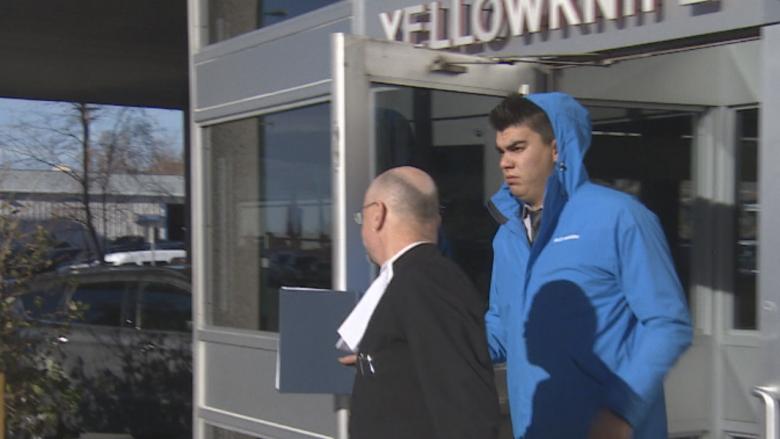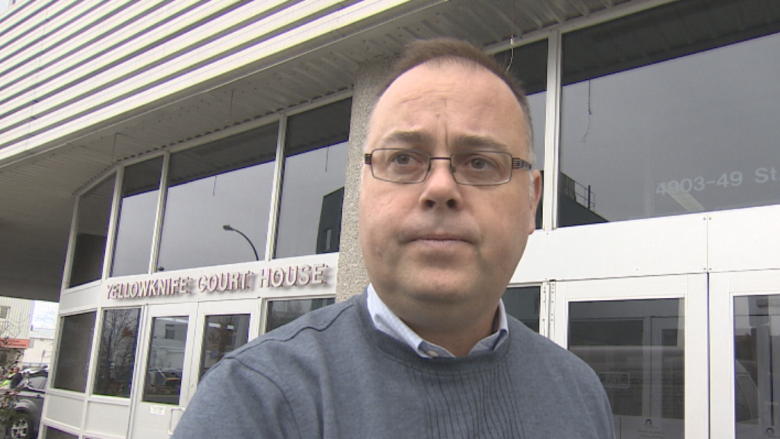Roman Bourque denied parole after serving 1 year for manslaughter in house party death
Roman Bourque's admission that he might drink alcohol again derailed his application for day parole, despite a recommendation from his parole officer that he be released after serving one year in prison for killing a 20-year-old man at a house party in Yellowknife.
Documents recently obtained by CBC show that Bourque, who was sentenced to five years in prison in October 2015 for manslaughter in the death of Emerson Curran, went before the Parole Board of Canada last November seeking full parole or day parole.
Both Bourque and Curran, who was from Ottawa and working at Air Tindi for the summer, were drunk at a house party in August 2013 when they got into an altercation over a spilled drink. Bourque punched Curran in the head, and the 20-year-old fell and hit his head on a piano. Bourque continued to punch Curran as he lay on the ground, pushing aside party goers who tried to stop him. Curran was medevaced to Edmonton, where he was declared brain dead and died.
In the Parole Board of Canada decision from November 2016, it was noted that Bourque attends Alcoholics Anonymous, now chairing meetings in jail. He's also completed a national substance abuse program and a violence prevention program. According to his parole supervisor, the 26-year-old often worked more than one job in prison and was meeting with a psychologist.
It was the opinion of his case management team, and thereby the Correctional Service of Canada, that Bourque be granted day parole. His case worker said there had been difficulties early on in his sentence, but Bourque had become a "pleasure to work with."
His parole officer also supported day parole, noting that Bourque had previously held a "victim's stance," but his views had since changed.
May drink alcohol again
Yet when Bourque got before the two board members, he was pressed about his issues with alcohol.
When asked if he was the type of person to get into fights when he drinks, he responded "not all the time."
Bourque said he previously drank four times a week, and would binge drink during the summer, but initially said alcohol wasn't a "huge factor" in his life.
The board members challenged that, pointing to the "extreme violence" that landed him in jail and his behaviour while out on bail.
Bourque has admitted that when he was on bail after his arrest, he breached his conditions by drinking alcohol two to three times a month. He also went on two vacations out of the country, including to an all-inclusive resort with his foster family and another trip with friends he admits are involved in drugs. He also said he used marijuana twice after the incident.
Bourque noted that his actions were disrespectful and "a slap in the face" to the victim's family, saying that he feels guilt and shame and his "heart goes out to them." He also read a letter of apology to Curran's family.
Bourque said that, after looking closer at his situation, alcohol is a bigger issue, but then told the parole board he would weigh the consequences "if I choose to drink in the future."
The board spoke to him about "possibly drinking" given the seriousness of his crime. Bourque stated that he was not going to lie and may choose to drink responsibly when he's no longer under conditions.
Parole board not convinced
The parole board took into consideration Bourque's family history and contributions to the community, namely playing and volunteering in community sports.
He's been in the foster system since the age of two, going in and out of various homes until he was placed with his current foster family at age 14.
It noted "family breakdown, foster care, lack of education, loss of cultural identity, exposure to substance abuse and the intergenerational impacts of the residential school system" as systemic issues that could have contributed to Bourque winding up in the criminal justice system.
He had several letters of support from friends and family. His foster mother also spoke on his behalf, saying that he is now aware of the lives he has impacted and the ripple effect of his behaviour. She said he's remorseful and has an extensive support network.
However, it was Bourque's own words that left the parole board members unconvinced that he could be successfully reintegrated into society.
"Alcohol abuse was a major contributing factor in your violent offence that resulted in the death of the victim," the decision reads.
"The Board is not convinced that you are committed to abstaining from the use of alcohol on a permanent basis given your responses today."
It also said his behaviour on bail and his attitude at the start of his sentence contributed to the board's lack of confidence in his reintegration.
The board members gave Bourque credit for being honest and the gains he's made in prison, but ultimately denied day parole and full parole, saying he didn't exhibit a "thorough understanding of the serious extent" of his substance abuse issues given that he's contemplating drinking alcohol in the future.



